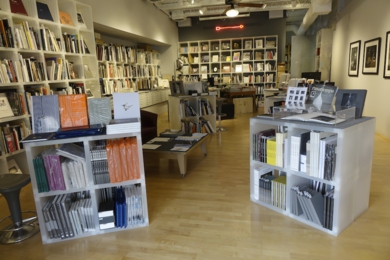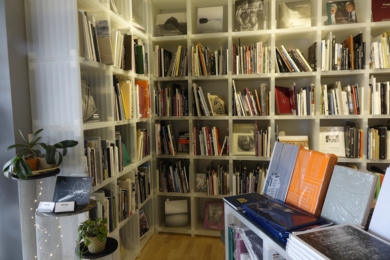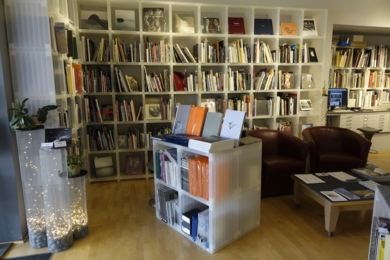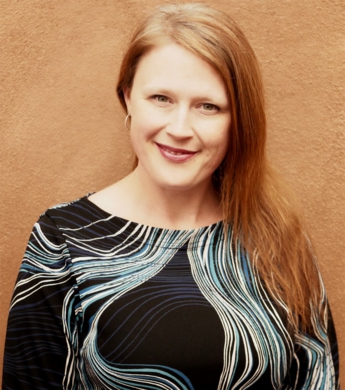Interview: Melanie McWhorter by Miwa Susuda
Book Division Manager at photo-eye
March 2015
Miwa: Please describe your work as Manager at Photoeye.
Melanie: Well, it is pretty amazing. I have managed the Bookstore for over 10 years and before that I did receiving, accounting, customer service; any number of jobs that one needs to do when you work for a small business. The job changed a lot over this time. We saw Amazon start and dominate the market, more publishers selling their own books, more print-on-demand and desktop publishing, the explosion of self-publishing, the expansion of the internet and e-books. There are so many books being published, but there still seems to be an audience for many of them. What I do at photo-eye is try to find great books. I focus on what our clients have purchased in the past, but it is also my job to show many of them what a good books is. It is difficult to find out what a book is truly like online. In the future the bookstore staff – myself, Sarah Bradley and Christopher J. Johnson – want to find more books that we love and share those with those who want to be shared with.
Miwa: Pls tell us about your view/idea about Japanese photography and books?
Melanie: What is there to say about Japanese books? I think that without the Japanese publishers/photographers/collectors the photobook would not have advanced as quickly as it has. Many of your readers will know about the history of Japanese photography including the legendary photographers like Daido Moriyama and Nobuyoshi Araki. Yet, Japanese contemporary photographers and publishers are still some of the most important contributors to the field and their passion for the medium helps to feed the photobook fire.
I love most Japanese books. We order books from Japan every week. I order from T&M Projects, Tanto Tempo Gallery, Akaaka, Superlabo, Akio Nagasawa, Shashasha, Tosei-sha Gallery, Amana, and many others.
Miwa: Pls tell us 5 favorite Japanese photographers (dead or alive).
Melanie: Wow, that is tough... I am going to deviate from this question a bit. I love Araki's flowers. I love Miyako Ishiuchi's lipstick. I love Rinko Kawauchi's eyelashes. I love Kazuo Kitai's road. I love Masao Yamamoto's white bowl on the white counter. I love Yoshihiko Ueda's blue-green redwoods.
Miwa: Do you own any Japanese photography book home?
Melanie: You made me go look. I thought I had more in my collection than I do have. I own Yoshihiko Ueda's Quinault, Rinko Kawauchi's Illuminance, Morimura's Self-Portrait as Art History, Fujii Tamotosu's Esumi, Hiroshi Watanabe's Findings, Satoru Watanabe's da.gatsita, and a few Yamamoto books. I would own many more if I could fit them in the library (and budget!).
Miwa: What’s challenge to work as Manager?
Melanie: The challenge of working as the manager of photo-eye Books is staying on top of all the books published. We came up with this position at photo-eye and before we conceived of the position, no one had done it. I had to make it up as we went along.
We have some staff or customer service issues, but mostly we just have to keep looking for new books. I check blogs, websites, and social media. I get personal emails, press releases and review copies, both solicited and unsolicited. What I dislike about my job: Saying no to books and receiving damaged books. My personal challenge: conquering my inbox.
Miwa: Do you enjoy receiving works by emerging artists/photographers?
Melanie: Of course I do. I often participate in portfolio reviews like Review Santa Fe where I meet emerging photographers. In the last few years, I had the opportunity to meet some of the artists who you have featured on Fraction Magazine Japan often with the accompaniment of a translator. My Japanese is limited to a feeble konichiwa and maybe an arigato.
Last year, I found Miki Hasegawa's handmade book “The Path of Million Pens”at Review Santa Fe. The book is a handmade, cloth-bound object that speaks about the issues, difficulties and joys of motherhood in Japan. The book represents her as a person bound between her mother and her daughter. She explores and explains her new identity through family photos and documents.
Tsutomu Yamagata brought his 16x20 silver gelatin prints to Santa Fe two years ago. For his project “Thirteen Orphans”, he engaged with people who frequented Tokyo's Ueno district. The project's title and concept is based off the game of mahjong and each print has a sentence the portrait sitter along the bottom of the print. The masterfully executed and printed photographs were an excellent representation of Tsutomo's investment of time and his own spirit and energy.
I learned a bit about Japanese culture from both projects. While I can never fully understand, I am more enlightened through their work.
For photo-eye, we sell many books that are by emerging artists. While we often sell the most of established artists' works, we love to take chances on great self-published books. I am most excited speaking with collectors who are willing take chances on lesser known photographers. They are buying and collecting for the love of the medium of photographer and book arts.
Also, opening a new box of books that I have not seen before is like Christmas everyday no matter who the photographer is.
Miwa: Is there any protocol to submit the books to you for considerations of stocking/consigning at Photoeye?
Melanie: We take review copies (Address: photo-eye Bookstore + Project Space, 376A Garcia Street, Santa Fe, NM 87501 USA). To save on the money and shipping, I usually ask for an email with a PDF of the book or link to the book. I may not look at it right away so I recommend sending a follow up email in a week or so. Some photographers insist on sending a copy because they say that I must see the book in person. There is nothing like holding a book in your hands so I usually do not argue. Our taste and selections at photo-eye are quite eclectic, but I suggest doing some research and signing up for our newsletter to see if we sell books like the one you hope to submit.
Miwa: Do you think running the good website important? What do you think makes your photoeye site successful? The annual best book section by notable figures has been really important/influential to many collectors, publishers and editors. Whose idea was it? Any difficulty or pleasure running this annual list?
Melanie: I think what makes our site successful is that we offer so many ways to explore the books. We show a book of the day, new arrivals, signed books, bestsellers, a daily bookshelf of in-stock books all on the bookstore front page. We have also prided ourselves as being a resource for photobooks especially since Rixon has been doing this for over 30 years. Currently, we are trying to focus more on the books that we are most excited about. I think this is also helpful because many collectors to not have the time to visit websites during the day and conduct research about what books they sold buy. We help them curate their collection. Some collectors like to call me personally and talk about books while others do not like the contact and only want to view the information online. Our site helps them focus on selected photography books while giving many choices.
The Best Books process in years past was limited to staff. We would eat lots of food, drink lots of wine and discuss, debate and argue about the large stack of the staff's nominated books as the potential best of the previous year. I looked forward to it for months. Our magazine editor would publish in the printed magazine. We had a few guest contributors in the printed magazine, John Gossage for instance, but not on the scale that we have now. I would say that is where idea first flowered. Since, 2007, I believe, we expanded to the monumental list of 25-30 contributors and over 200 titles. Each year, we select different contributors and we do not supply them with a list. The selection depends on chance – if they saw a book – and taste. I get excited about it every year.
Miwa: What do you think about digital photo book vs. actual photo books? Is future of photo book positive?
Melanie: There was a piece that I did for another publication and in that I said that books are to be smelled, touched and seen. It is all important: the way that the book rests in your hand or lap, the texture of paper, the sheen of the varnish, the smell of the inks. For the photobook to survive is that it has to be an object. It has to be an art piece in itself.
I do envision a day when the photobook is changed by a new technology. This thing does not exist, but it will. I cannot see what it is and this looming monster or angel will defeat or elevate the photobook as it currently exists. Until then, the photobook object will not be conquered by the e-book.
Miwa: What do you do to keep up your integrity as Manager firm and good?
Melanie: Integrity. That is a difficult concept. Let's say strong moral principles for the definition. I am not immune to politics. If Diogenes were to encounter me on the streets of Santa Fe looking for the honest man, or woman in this case, he would not shine the light on me. Being so connected to so many people in the photography industry can make choices complicated at times. I meet many photographers, I like them and I engage with them and their work. Having a relationship with many people in the photography world makes choices difficult at times, but I try to be honest about my choices and true to myself. I am not sure if that is what you were asking about integrity...
Miwa: Do you love your job? What do you enjoy most?
Melanie: Yes, I love my job. Miwa, there is hardly anyone else doing this job in the country. I often tell people that there are only two of us: me and Miwa. I feel incredibly lucky.
I love making most of the decisions about the books. I collaborate with the staff to make decisions about what to carry and how to promote those books, but I make many of the decisions. I like getting to know the artists and engaging on a daily basis with artists and publishers all over the planet who feel equally as passionate as I do about the medium. I love being part of something much larger than myself.
Miwa: Everybody pays a huge respect and attention to your company. What do you think makes your company outstanding in the field and what do you do to realize it?
Melanie: Well, I think it is longevity and adaptability. Rixon Reed started the company in Austin, Texas over 30 years ago and I have been around for over 17 years after it moved to Santa Fe, NM. We have watched the industry change and tried to stay ahead of the changes and respond to the shifts that we did not anticipate. Rixon is great at thinking of new projects, particularly online projects.
I also like to think that it is relationships with publishers, photographers and customers. I feel that this is one of the most important part of a business. I try to be responsive and participate. I do not say it enough, but we owe thanks to so many people.
Miwa: Your company and you have such a strong tie with many important photographers worldwide. How do you do that? Do you enjoy working with photographers?
Melanie: : Once again, I think that photo-eye's reputation helps and, as in previous response, building and maintaining relationships. Some photographers are very supportive of those who are trying to help them with book sales and to promote their work even if they do not need the help. To name a few over the years who have been incredibly gracious would be an extensive list. I usually just humbly ask them to sign books, contribute to the Book of the Week or Best Books. Most of them are equally as addicted to photobooks as me and they enjoy sharing their opinion or signature. Also, I try to remember to say thanks!
Miwa: Do you love photography? What makes you excited about photography?
Melanie: Since I was a child, I loved photography. I do not have a moment when it happened, but has been there ever since. What is amazing about photography, like most occupations or even hobbies, is the excitement that is generated from within. I think of photography as a different animal than most art forms and we are a world within ourselves. I look at images and more images and tend not to be tired of looking at images.
Melanie McWhorter:
Melanie McWhorter has managed photo-eye's Bookstore for 17 years and is a regular contributor to the photo-eye Blog . She has been interviewed about photography in numerous print and online publications including PDN, The Picture Show and LayFlat; has judged the prestigious photography competitions Daylight Photo Awardsand Fotografia: Fotofestival di Roma’s Book Prize; has reviewed portfolios at Fotografia, Photolucida, Review Santa Fe, PhotoNOLA, Lishui Photography Festival; and taught and lectured at numerous venues.
Visit her website, melaniemcwhorter.com.





 Previous page
Previous page
